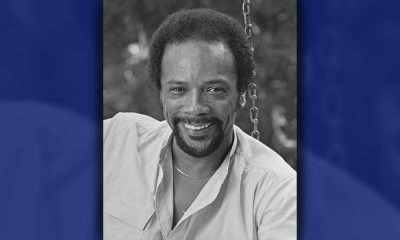Politics
5 Things to Know Before Obama Rolls Out His Budget Monday

In this March 4, 2014 file photo, copies of President Barack Obama’s proposed fiscal 2015 budget are set out for distribution on Capitol Hill in Washington. (AP Photo/J. Scott Applewhite, File)
Connie Cass, ASSOCIATED PRESS
WASHINGTON (AP) — A quick quiz:
Monday is —
a) Groundhog Day
b) Budget Day
c) A day for repeating the same old arguments over spending and taxes, only louder.
d) All of the above.
If you picked “d,” you’re in the proper spirit for federal Budget Day, which appropriately falls on Groundhog Day this year. It’s safe to predict we’re in for way more than six more weeks of Republicans and Democrats fighting over how to spend our money.
Here are five things to know before President Barack Obama’s 2016 budget fully emerges Monday:
___
IT’S JUST AN OPENING BID
Despite all the hoopla surrounding it, a president’s budget is merely a suggestion. That’s especially true this year, with Obama delivering his multi-trillion-dollar wish list to a Senate and House run by the opposition.
The Constitution gives Congress power to decide how to spend taxpayers’ money. After lawmakers get the president’s budget, they’ll set about coming up with their own, very different, spending plan. There’s a hitch, though — their legislation needs Obama’s signature to become law.
If the president and Congress can’t compromise on spending, that’s how we end up with a partial government shutdown. Republican leaders and Obama say they don’t want that to happen this year.
Still, the usual big disputes loom: Obama wants more spending and higher taxes on the wealthy. Most Republicans want to spend less — except on the military — and resist tax increases.
Plus, this year Republicans are promising to use spending bills to attack Obama’s signature health care law and to roll back his order giving some immigrants relief from deportation.
___
OBAMA WILL BID HIGH
The president will call for increasing spending on agency operating budgets by 7 percent next year, blowing through limits set in an earlier bipartisan deal.
Previewing the detailed document to be released Monday, the White House said it would call for spending about $74 billion more next year than the painful automatic cuts Obama signed into law in that 2011 deal commonly known as the “sequester.” Those harsh automatic cuts were originally set in motion as a threat that would force bipartisan agreement to replace them with something more sensible, but it didn’t work.
Obama would roughly divide the extra money he seeks between the military and domestic programs, such as college aid, medical research and child care.
The White House, without giving details yet, says Obama would offset his spending increases by cutting inefficient programs and closing tax loopholes. In that way, he could continue the recent trend of shrinking the nation’s annual budget deficits.
Republicans say that’s no good. They prefer to tackle the deficit by holding domestic spending in check, or trimming even more.
___
A BIG QUESTION: HOW MUCH DOES THE MILITARY GET?
The military brass has been pleading for relief from their automatic spending limits. Many lawmakers in both parties, eyeing terror attacks and trouble spots around the globe, are anxious to help.
Obama’s proposal to raise the defense budget by $38 billon would allow for more ships and fighter jets. By bundling the military increase with more domestic spending, Obama will pressure Republicans eager to boost the military budget to give in to some of his priorities.
Will Republicans insist on holding the line on spending, even if it means the Pentagon has to go without, too? And how far are Democratic lawmakers and Obama willing to go in using national defense as a bargaining chip?
___
DETAILS MATTER
If Congress is sure to reject and redo Obama’s budget proposal, you might wonder: Why does he bother?
For one thing, the law says he has to submit a budget to Congress by the first Monday in February, although Obama has sometimes missed that deadline.
Plus, the federal budget is a big deal. It’s expected to be in the vicinity of $4 trillion — that’s trillion with a “t” — for the fiscal year beginning in October.
It goes much deeper than political rhetoric about ending big government or boosting the middle class.
The budget carries thousands and thousands of decisions about concrete things the government does — like paying park rangers, Border Patrol agents and workers who answer IRS help lines. Spending money for air traffic control, medical research and food inspection. Weeding out ineffective programs and launching new ones that, hopefully, work better.
The exercise has gone awry over the last few years, leading to showdowns and a 2013 shutdown and failure to complete the normal budget process in a gridlocked Congress.
But the budget minutia that federal agencies sweat over and congressional committees are charged with overseeing is what keeps the U.S. government running.
___
MOST OF THE BUDGET IS ON AUTOPILOT
Running federal agencies isn’t even the half of it.
The biggest share of the budget goes to what’s called “mandatory spending” — ongoing payments that don’t need annual approval by Congress. Social Security, Medicare and Medicaid are the biggies. Others include unemployment checks, food stamps and pensions for veterans and government retirees.
To take on the nation’s long-term debt problem, lawmakers and the president would have to deal with these growing costs.
So far, attempts to reach this sort of “grand bargain” have failed, repeatedly.
____
Associated Press writers Josh Lederman and Andrew Taylor contributed to this report.
Follow Connie Cass on Twitter: http://www.twitter.com/ConnieCass.
Copyright 2015 The Associated Press. All rights reserved. This material may not be published, broadcast, rewritten or redistributed.
###
Activism
Oakland Post: Week of December 31, 2025 – January 6, 2026
The printed Weekly Edition of the Oakland Post: Week of – December 31, 2025 – January 6, 2026

To enlarge your view of this issue, use the slider, magnifying glass icon or full page icon in the lower right corner of the browser window.
Activism
2025 in Review: Seven Questions for Assemblymember Lori Wilson — Advocate for Equity, the Environment, and More
Her rise has also included several historic firsts: she is the only Black woman ever appointed to lead the influential Assembly Transportation Committee, and the first freshman legislator elected Chair of the California Legislative Black Caucus. She has also been a vocal advocate for vulnerable communities, becoming the first California legislator to publicly discuss being the parent of a transgender child — an act of visibility that has helped advanced representation at a time when political tensions related to social issues and culture have intensified.

By Edward Henderson, California Black Media
Assemblymember Lori D. Wilson (D-Suisun City) joined the California Legislature in 2022 after making history as Solano County’s first Black female mayor, bringing with her a track record of fiscal discipline, community investment, and inclusive leadership.
She represents the state’s 11th Assembly District, which spans Solano County and portions of Contra Costa and Sacramento Counties.
Her rise has also included several historic firsts: she is the only Black woman ever appointed to lead the influential Assembly Transportation Committee, and the first freshman legislator elected Chair of the California Legislative Black Caucus. She has also been a vocal advocate for vulnerable communities, becoming the first California legislator to publicly discuss being the parent of a transgender child — an act of visibility that has helped advanced representation at a time when political tensions related to social issues and culture have intensified.
California Black Media spoke with Wilson about her successes and disappointments this year and her outlook for 2026.
What stands out as your most important achievement this year?
Getting SB 237 passed in the Assembly. I had the opportunity to co-lead a diverse workgroup of colleagues, spanning a wide range of ideological perspectives on environmental issues.
How did your leadership contribute to improving the lives of Black Californians this year?
The Black Caucus concentrated on the Road to Repair package and prioritized passing a crucial bill that remained incomplete during my time as chair, which establishes a process for identifying descendants of enslaved people for benefit eligibility.
What frustrated you the most this year?
The lack of progress made on getting Prop 4 funds allocated to socially disadvantaged farmers. This delay has real consequences. These farmers have been waiting for essential support that was promised. Watching the process stall, despite the clear need and clear intent of the voters, has been deeply frustrating and reinforces how much work remains to make our systems more responsive and equitable.
What inspired you the most this year?
The resilience of Californians persists despite the unprecedented attacks from the federal government. Watching people stay engaged, hopeful, and determined reminded me why this work matters and why we must continue to protect the rights of every community in our state.
What is one lesson you learned this year that will inform your decision-making next year?
As a legislator, I have the authority to demand answers to my questions — and accept nothing less. That clarity has strengthened my approach to oversight and accountability.
In one word, what is the biggest challenge Black Californians are facing currently?
Affordability and access to quality educational opportunities.
What is the goal you want to achieve most in 2026?
Advance my legislative agenda despite a complex budget environment. The needs across our communities are real, and even in a tight fiscal year, I’m committed to moving forward policies that strengthen safety, expand opportunity, and improve quality of life for the people I represent.
Activism
2025 in Review: Seven Questions for Assemblymember Tina McKinnor, Champion of Reparations, Housing and Workers’ Rights
In 2025, McKinnor pushed forward legislation on renters’ protections, re-entry programs, reparations legislation, and efforts to support Inglewood Unified School District. She spoke with California Black Media about the past year and her work. Here are her responses.

By Joe W. Bowers Jr., California Black Media
Assemblymember Tina McKinnor (D-Inglewood) represents
California’s 61st Assembly District.
As a member of the California Legislative Black Caucus (CLBC),
McKinnor was elected in 2022. She chairs the Los Angeles County Legislative Delegation and leads the Assembly Public Employment and Retirement Committee. McKinnor also served as a civic engagement director, managed political campaigns, and worked as chief of staff for former Assemblymembers Steven Bradford and Autumn Burke.
In 2025, McKinnor pushed forward legislation on renters’ protections, re-entry programs, reparations legislation, and efforts to support Inglewood Unified School District. She spoke with California Black Media about the past year and her work. Here are her responses.
Looking back on 2025, what do you see as your biggest win?
Assembly Bill (AB) 628. If rent is $3,000, people should at least have a stove and a refrigerator. It’s ridiculous that people were renting without basic appliances.
I’m also proud that I was able to secure $8.4 million in the state budget for people coming home from incarceration. That includes the Homecoming Project, the menopause program for incarcerated women, and the Justice Leaders Program.
How did your leadership help make life better for Black Californians this year?
After the Eaton Fire, I pushed to get the same kind of support for affected areas that wealthier regions get after disasters.
I also did a lot of work building political power— establishing the Black Legacy PAC and California for All of Us PAC so we could support Black candidates and educate voters. We also called voters to make sure they understood Prop 50.
People need to understand this: there are only 12 Black legislators in the Capitol. Folks act like we can just walk in and pass reparations, but that’s not how it works.
What frustrated you most this year?
The governor did not have the political will to sign these bills: AB 57 and AB 62. They both passed overwhelmingly in the Assembly and the Senate. We did the work. The only person who didn’t have the political will to sign them was the governor.
The public needs to ask the governor why he didn’t sign the bills. We can’t keep letting people off the hook. He has to answer.
I also introduced AB 51 — the bill to eliminate interest payments on Inglewood Unified School District’s long-standing state loan — held in the Appropriations Committee. That was frustrating,
What inspired you most in 2025?
The civil rights trip to Alabama was life changing. We visited the Legacy Museum and the National Memorial for Peace and Justice. We took members of the Black, Latino, Jewish, and API caucuses with us. It changed all of us.
People aren’t always against us — they just don’t know our history.
What’s one lesson from 2025 that will shape how you approach decisions next year?
The legislative trip to Norway taught me that collaboration matters. Government, labor, and industry sit down together there. They don’t make villains. Everybody doesn’t get everything they want, but they solve problems.
What’s the biggest challenge facing Black Californians in one word?
Inequity. It shows up in housing, wealth, stress – all these things.
What’s the number one goal you want to accomplish in 2026?
Bringing back AB 57 and AB 62, and securing money for the Inglewood Unified loan interest forgiveness.
-

 Bay Area3 weeks ago
Bay Area3 weeks agoPost Salon to Discuss Proposal to Bring Costco to Oakland Community meeting to be held at City Hall, Thursday, Dec. 18
-

 Activism3 weeks ago
Activism3 weeks agoMayor Lee, City Leaders Announce $334 Million Bond Sale for Affordable Housing, Roads, Park Renovations, Libraries and Senior Centers
-

 Activism4 weeks ago
Activism4 weeks agoOakland Post: Week of December 10 – 16, 2025
-

 Activism3 weeks ago
Activism3 weeks agoOakland School Board Grapples with Potential $100 Million Shortfall Next Year
-

 Arts and Culture3 weeks ago
Arts and Culture3 weeks agoFayeth Gardens Holds 3rd Annual Kwanzaa Celebration at Hayward City Hall on Dec. 28
-

 Activism3 weeks ago
Activism3 weeks ago2025 in Review: Seven Questions for Black Women’s Think Tank Founder Kellie Todd Griffin
-

 Advice3 weeks ago
Advice3 weeks agoCOMMENTARY: If You Don’t Want Your ‘Black Card’ Revoked, Watch What You Bring to Holiday Dinners
-

 Activism3 weeks ago
Activism3 weeks agoAnn Lowe: The Quiet Genius of American Couture


























































